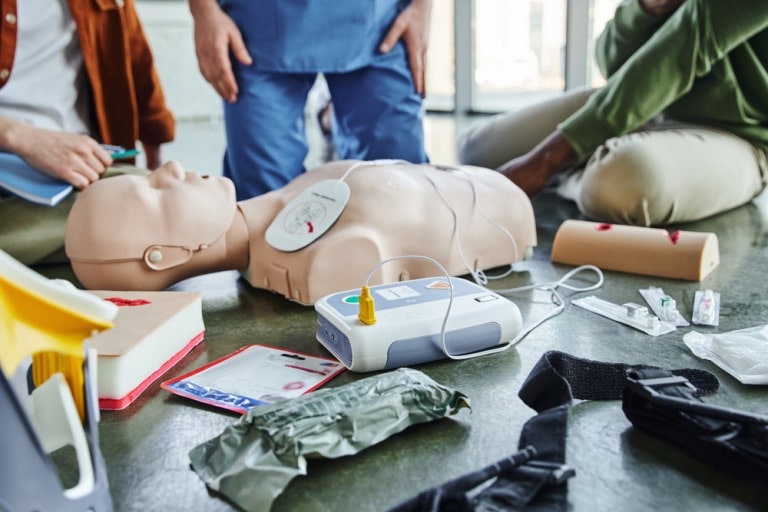What are the 5 Key Benefits of BLS Certification?

When it comes to preparing for emergencies, having a basic life support (BLS) certification is invaluable. BLS training equips you with the ability to perform CPR, use an AED, and manage airway obstructions, which can be life-saving in critical moments. This certification enhances your readiness, boosts confidence, and opens up professional opportunities. It ensures you’re well-prepared to handle a medical emergency.
This article discusses why obtaining BLS certification can be good for you.
Key Benefits of BLS Certification
By mastering BLS skills, you can provide crucial support during cardiac arrest, choking, or other medical emergencies. Beyond enhancing personal preparedness, BLS courses also foster a safer environment in workplaces, schools, and public spaces. Let us look at the benefits of a BLS course in detail below:
-
Enhanced Emergency Response Skills
The primary benefit of BLS certification is the development of critical emergency response skills. In an urgent situation, knowing how to perform cardiopulmonary resuscitation (CPR), use an automated external defibrillator (AED), and assist with choking can make a major difference. With BLS knowledge, you’ll be equipped to:
- Perform effective CPR: You’ll learn how to deliver high-quality chest compressions and rescue breaths. These techniques can help maintain blood flow and oxygen to vital organs until advanced medical help arrives.
- Use an AED: You’ll understand how to operate an AED, a device that can provide electrical shocks to the heart to restore a normal rhythm. This knowledge is crucial as early defibrillation can increase the chances of survival in cases of sudden cardiac arrest.
- Manage airway obstruction: You’ll be trained in techniques to clear blockages from the airway, which is essential for ensuring that an affected person can breathe properly.
-
Improved Job Prospects and Professional Growth
BLS certification is often mandatory for many professions, especially those in healthcare, emergency services, and education. Thus, obtaining the certifications will enhance your qualifications and increase your job prospects. BLS credentials are required for:
- Healthcare professionals: BLS training is crucial for doctors, nurses, paramedics, and other medical personnel. Employers and patients alike can feel confident that you are prepared and can handle emergencies.
- Education and childcare workers: Having BLS knowledge can be a significant asset if you work with children or in educational settings. Schools and daycare centers often require staff to be certified in BLS to ensure the safety of students.
- Career advancement: Even if your current job doesn’t require BLS training, having it can make you a more competitive candidate for promotions or new roles. It shows your commitment to professional development and readiness to handle critical situations.
-
Increased Confidence in Crisis Situations
One of the most profound benefits of BLS certification is the increase in confidence to handle emergencies. Knowing you have the skills and knowledge required to handle a crisis will boost your confidence in tackling such situations. The training will help you in:
- Preparedness: You’ll feel more prepared and less overwhelmed if an emergency arises. The structured training and practice you receive during the course help you become familiar with emergency procedures.
- Decision-making: BLS training involves scenario-based learning that helps you make quick, informed decisions. This is an essential skill in emergency situations where time is important.
-
Contribution to Community Safety
By obtaining BLS training, you’re not only benefiting yourself but also contributing to the safety of your community. Your BLS skills can add onto:
- Community resilience: When more people are trained in BLS, the community becomes more resilient to emergencies. You can contribute to developing a network of people ready to help out right away in times of need.
- Teaching others: Your knowledge can extend beyond your immediate surroundings. You can teach family members, friends, or colleagues the basics of BLS, helping to spread life-saving skills throughout your community.
-
Ongoing Learning and Skill Maintenance
BLS certification is not just a one-time achievement; it encourages ongoing learning and skills maintenance. Here is how keeping your certification up-to-date ensures your skills remain current and effective:
- Regular updates: BLS guidelines and techniques evolve based on new research and advancements in medical science. By renewing your certification, you stay informed about the latest practices and techniques.
- Continued practice: BLS courses often emphasize the importance of practice and review. This continuous learning process helps reinforce skills and keeps you ready to perform them correctly when needed.
Conclusion
BLS certification offers numerous advantages that go well beyond the basic knowledge of CPR. It equips you with crucial life-saving skills, such as effective chest compressions, AED usage, and airway management, which are essential in emergencies. This training not only enhances your professional credentials but also significantly boosts your confidence to act decisively in emergency situations. Additionally, by becoming certified, you contribute towards community safety, as your skills can aid others in critical moments.





